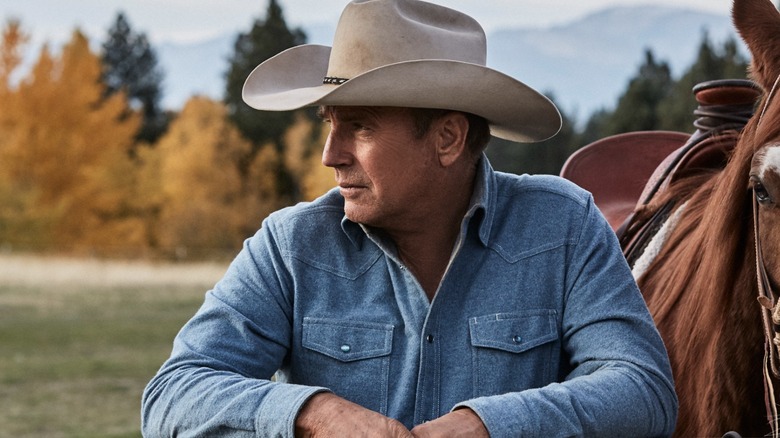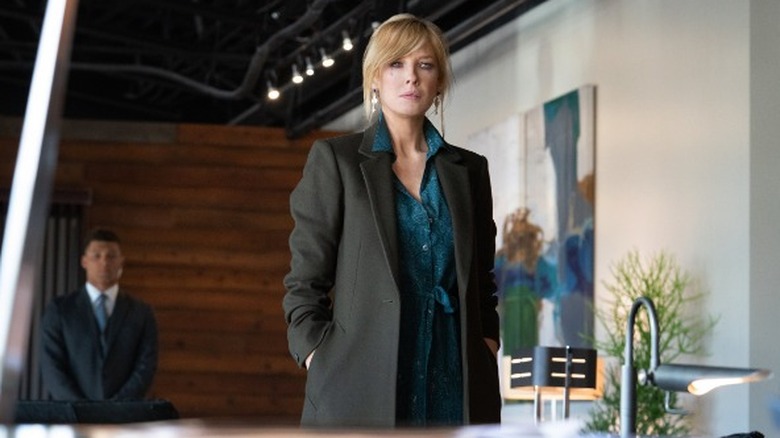Taylor Sheridan Acknowledges That Yellowstone Is Supposed To Be Morally Ambiguous
Are the Duttons on "Yellowstone" inherently evil? Well, there's a lot of debate surrounding that. In an article for And Philosophy last April, Dr. Jamey Heit examined the morality of the show, focusing particular attention on Beth Dutton's (Kelly Reilly) interest in Nietzsche's "Beyond Good and Evil" in the Season 3 episode "Meaner Than Evil." Dr. Heit said that the show rejects a simple understanding of morality — instead, it's more complex. The Duttons' enemies are, according to Dr. Heit, evil and don't fight fair. That forces the Duttons to be, as the episode title suggests, meaner than evil. Of course, that interpretation stands on the assumption that the Duttons deserve to hold on to their ranch. Not everyone is on board with that.
In a Reddit thread in the r/Television subreddit, after watching the first season, u/stealnshare argued that the Duttons deserve to lose their ranch because they are "horrible people with no redeeming or sympathetic characteristics " and that their land is stolen from the Native Americans anyway. In a different thread in the r/YellowstonePN subreddit, as they binged "Yellowstone" in late 2021 while it was deep into Season 4, u/Thicc-as-Theives noted everything that happens to the Duttons, particularly the assassination attempt against the family, is the fault of John Dutton III (Kevin Costner) and the actions he's taken to defend the ranch.
In both cases, that opened up a larger discussion comparing "Yellowstone" to other TV shows that focus on anti-heroes or even arguably evil characters such as "The Sopranos" and "Breaking Bad." But what does its creator have to say? Taylor Sheridan naturally has his own interpretation of the morality of the show and, apparently, he always intended it to be morally ambiguous.
Taylor Sheridan thinks the morality of defending a kingdom isn't cut and dry
In an interview with The Atlantic ahead of Season 5, Taylor Sheridan discussed the morality of "Yellowstone" and compared John Dutton (Kevin Costner) to a king ruling over a kingdom. "When you have a kingdom, and you are the king, is there such a thing as morality?" Sheridan said rhetorically.
While that statement sounds somewhat naive on the surface, Sheridan went on to elaborate, "Because anyone trying to take your kingdom and remove you as king is going to replace your morality for theirs. So does morality factor into the defense of the kingdom?" The "Yellowstone" creator believes that the moral question is at the heart of what the show is about. But this argument doesn't hold water for viewers — such as those mentioned above — who feel the Duttons are deeply immoral themselves.
One of the more heinous acts that the show depicts the Duttons doing comes in the Season 2 finale "Sins of the Father," where John murders an out-of-state land developer who seeks to turn the Yellowstone ranch into a metropolitan area, driving up the Duttons' taxes to the point where they will likely lose their land. It's impossible to justify killing a man for the sake of anything — let alone an inanimate plot of land — even with Sheridan's justification of the king defending his kingdom.
But what if the said land developer was evil and didn't fight fair? It's only when you look at things from Nietzsche's perspective, where good and evil are entirely relative concepts, that the interpretation shifts. If there's no morality, then there are no villains in "Yellowstone" either — and all is fair in land wars.

